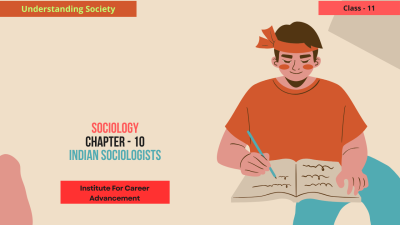Indian Sociologists - Class 11

₹190
₹599
"Indian Sociologists" is a pivotal chapter in Class 11 Sociology, exploring the rich intellectual tradition of sociological thought in India. It delves into the contributions of eminent Indian sociologists who have significantly shaped the understanding of Indian society and its social processes. Key Themes and Concepts: Emergence of Indian Sociology: This section examines the historical context in which Indian sociology emerged as a distinct field of study, influenced by both Western sociological traditions and unique Indian cultural and social realities. Pioneering Indian Sociologists: It focuses on the contributions of early Indian sociologists like G.S. Ghurye, M.N. Srinivas, and A.R. Desai, who laid the foundation for Indian sociological research. Diverse Perspectives: The chapter explores the diverse theoretical and methodological approaches adopted by Indian sociologists, including structural-functionalism, Marxism, feminism, and postcolonialism. Major Themes and Issues: It highlights the key themes and issues that have been central to Indian sociological research, such as caste, religion, social change, gender, and rural development. Contemporary Indian Sociology: The chapter also examines the contributions of contemporary Indian sociologists, who are actively engaged in research on diverse social issues and challenges facing India today. Learning Outcomes: Understanding the historical development of Indian sociology. Acquiring knowledge about the key ideas and contributions of major Indian sociologists. Developing an appreciation for the diverse theoretical and methodological perspectives in Indian sociology. Analyzing contemporary social issues and problems through a sociological lens. By studying this chapter, students gain a comprehensive understanding of the rich intellectual tradition of Indian sociology and its relevance in understanding contemporary Indian society. This knowledge is essential for further exploration of sociological concepts and their application in Indian context. "ভারতীয় সমাজবিজ্ঞানীরা" হল একাদশ শ্রেণীর সমাজবিজ্ঞানের একটি গুরুত্বপূর্ণ অধ্যায়, যা ভারতে সমাজতাত্ত্বিক চিন্তার সমৃদ্ধ বুদ্ধিবৃত্তিক ঐতিহ্যকে অন্বেষণ করে। এটি বিশিষ্ট ভারতীয় সমাজবিজ্ঞানীদের অবদানের উপর আলোকপাত করে, যাঁরা ভারতীয় সমাজ এবং এর সামাজিক প্রক্রিয়াগুলির বোধগম্যতাকে উল্লেখযোগ্যভাবে রূপ দিয়েছেন। মূল বিষয় ও ধারণাঃ ভারতীয় সমাজবিজ্ঞানের উত্থানঃ এই বিভাগটি সেই ঐতিহাসিক প্রেক্ষাপটটি পরীক্ষা করে যেখানে ভারতীয় সমাজবিজ্ঞান পাশ্চাত্য সমাজতাত্ত্বিক ঐতিহ্য এবং অনন্য ভারতীয় সাংস্কৃতিক ও সামাজিক বাস্তবতা উভয়ের দ্বারা প্রভাবিত হয়ে অধ্যয়নের একটি স্বতন্ত্র ক্ষেত্র হিসাবে আবির্ভূত হয়েছিল। অগ্রগামী ভারতীয় সমাজবিজ্ঞানীঃ এটি G.S. এর মতো প্রাথমিক ভারতীয় সমাজবিজ্ঞানীদের অবদানের উপর দৃষ্টি নিবদ্ধ করে। ঘুরিয়ে, M.N. শ্রীনিবাস, এবং A.R. দেশাই, যিনি ভারতীয় সমাজতাত্ত্বিক গবেষণার ভিত্তি স্থাপন করেছিলেন। বৈচিত্র্যময় দৃষ্টিভঙ্গিঃ এই অধ্যায়টি ভারতীয় সমাজবিজ্ঞানীদের দ্বারা গৃহীত বিভিন্ন তাত্ত্বিক এবং পদ্ধতিগত পদ্ধতির অন্বেষণ করে, যার মধ্যে রয়েছে কাঠামোগত-কার্যকারিতা, মার্কসবাদ, নারীবাদ এবং উত্তর-উপনিবেশবাদ। প্রধান বিষয় এবং বিষয়গুলিঃ এটি ভারতীয় সমাজতাত্ত্বিক গবেষণার কেন্দ্রবিন্দুতে থাকা মূল বিষয় এবং বিষয়গুলি যেমন বর্ণ, ধর্ম, সামাজিক পরিবর্তন, লিঙ্গ এবং গ্রামীণ উন্নয়নের উপর আলোকপাত করে। সমসাময়িক ভারতীয় সমাজবিজ্ঞানঃ এই অধ্যায়ে সমসাময়িক ভারতীয় সমাজবিজ্ঞানীদের অবদানও পরীক্ষা করা হয়েছে, যারা আজ ভারতের সামনে বিভিন্ন সামাজিক সমস্যা এবং চ্যালেঞ্জ নিয়ে গবেষণায় সক্রিয়ভাবে জড়িত। শেখার ফলাফলঃ ভারতীয় সমাজবিজ্ঞানের ঐতিহাসিক বিকাশকে বোঝা। প্রধান ভারতীয় সমাজবিজ্ঞানীদের মূল ধারণা এবং অবদান সম্পর্কে জ্ঞান অর্জন করা। ভারতীয় সমাজবিজ্ঞানের বৈচিত্র্যময় তাত্ত্বিক ও পদ্ধতিগত দৃষ্টিভঙ্গির প্রতি উপলব্ধি গড়ে তোলা। সমাজতাত্ত্বিক লেন্সের মাধ্যমে সমসাময়িক সামাজিক সমস্যা এবং সমস্যাগুলি বিশ্লেষণ করা। এই অধ্যায়টি অধ্যয়নের মাধ্যমে শিক্ষার্থীরা ভারতীয় সমাজবিজ্ঞানের সমৃদ্ধ বুদ্ধিবৃত্তিক ঐতিহ্য এবং সমসাময়িক ভারতীয় সমাজকে বোঝার ক্ষেত্রে এর প্রাসঙ্গিকতা সম্পর্কে ব্যাপক ধারণা অর্জন করে। এই জ্ঞান সমাজতাত্ত্বিক ধারণাগুলির আরও অন্বেষণ এবং ভারতীয় প্রেক্ষাপটে তাদের প্রয়োগের জন্য অপরিহার্য।
Learn more
 0
0 